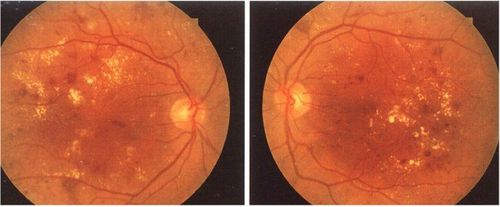This is an automatically translated article.
This article is professionally consulted by Master, Resident Doctor Dang Thi Ngoan - Pediatrician - Neonatologist - Department of Pediatrics - Neonatology - Vinmec Ha Long International Hospital. Uncle used to be a lecturer in the Department of Pediatrics - Hai Phong University of Medicine and Pharmacy, and was granted a certificate in Pediatrics at home and abroad such as: Westmead Hospital, Australia; Hai Phong Medical University. Doctor has strengths in the diagnosis and treatment of diseases in infants and young children.Neonatal retinopathy is one of the challenges premature babies face. Stages of retinopathy in infants progress quite quickly, from mild to severe, can cause blindness if not timely intervention.
1. Neonatal retinopathy
The last 12 weeks of pregnancy is the period when the baby's eyes will develop the fastest. Retinal blood vessels form at the optic nerve at the back of the eye and gradually reach the edges of the peripheral retina. By the time your baby is born, most of the blood vessels in the retina are almost complete. The retina will gradually develop fully in the first few weeks of life.
If the baby is born too early, the blood vessels may stop growing or continue to develop in an abnormal way. An increase in oxygen but a decrease in nutrients causes weak and fragile blood vessels to burst, leading to bleeding in the eye and scarring. When these scar tissue shrinks, it pulls the retina away from its normal position. Ophthalmologists call this phenomenon retinal detachment.
Infantile retinopathy is also the leading cause of visual impairment, even permanent blindness in premature babies.

Bệnh võng mạc ở trẻ sơ sinh gây ảnh hưởng đến thị lực
2. Progression of the disease
Neonatal retinopathy does not manifest immediately after birth. At this time, the baby's eyes only have weak and immature blood vessels, so they cannot provide enough nutrients to nourish the retina.
After a while, if these blood vessels stop growing or grow incorrectly, retinopathy develops. This means that not all premature babies get the disease. In addition, neonatal retinopathy is also divided into 3 levels as follows:
Mild disease, spontaneously resolved without any intervention Moderate disease, partially self-healing without treatment treatment, but need long-term monitoring to limit dangerous complications later on Serious illness, with the risk of permanent blindness if not detected early and treated promptly At the mild stage of the disease, the baby's eyes can still look outside. normal, so parents cannot recognize the disease by mere observation. However, when it is found that the child's eyes have strange symptoms, it means that the disease is in a late stage, with little hope of cure.
Premature retinopathy should be screened about 4 weeks after the baby is born, even if the baby is still in hospital care or has been discharged. The ophthalmologist will use special equipment along with an indirect ophthalmoscope to evaluate, diagnose and monitor the child.
3. Stages of retinopathy in infants

Bố mẹ nên đưa trẻ đi khám mắt thường xuyên, theo dõi lâu dài theo đúng lịch hẹn bác sĩ chỉ định
The progression of retinopathy is very fast, it only takes a few weeks for the disease to be mild enough to turn into a dangerous stage. Therefore, parents should not be subjective, instead, they must take their children for regular eye exams and long-term follow-up according to the doctor's appointment schedule. This will help the specialist team choose the most appropriate treatment for the baby, while promoting optimal healing.
Stages of infantile retinopathy include:
Stage 1 - The blood vessels develop mildly abnormally. Most children with this disease at this stage can recover on their own, keeping normal vision without needing treatment. Stage 2 - Moderately abnormal growth of blood vessels. The degree of vascular deviation is more than in stage 1, but the disease is still likely to improve on its own without treatment. Stage 3 - Severely abnormal blood vessels develop. Sometimes a child will have a plus disease that causes the blood vessels in the retina to become dilated and twisted. Comorbidities are signs that retinopathy in children is getting worse. Interventional treatment at this time is necessary to prevent retinal detachment. Stage 4 - Similar to stage 3 but the retina has begun to partially detach. Urgent treatment is required to protect the child's eyesight. Stage 5 - The retina is completely detached. The retina is completely displaced from the inner wall of the eyeball. Applying some specific treatment measures will partially limit severe vision damage or permanent blindness. All babies born 4-8 weeks earlier than expected, with low birth weight and/or requiring oxygen support should be screened for neonatal retinopathy. The process of monitoring and periodic eye exams requires long-term patience because the stages of retinopathy in infants will go from no symptoms to dangerous complications. Taking care of a healthy pregnancy to prevent premature birth is the most effective way to prevent retinopathy.
As a key area of Vinmec Health system, Pediatrics Department always brings satisfaction to customers and is highly appreciated by industry experts with:
Gathering a team of top doctors and nurses in Pediatrics : consists of leading experts with high professional qualifications (professors, associate professors, doctorates, masters), experienced, worked at major hospitals such as Bach Mai, 108.. Doctors All doctors are well-trained, professional, conscientious, knowledgeable about young psychology. In addition to domestic pediatric specialists, the Department of Pediatrics also has the participation of foreign experts (Japan, Singapore, Australia, USA) who are always pioneers in applying the latest and most effective treatment regimens. . Comprehensive services: In the field of Pediatrics, Vinmec provides a series of continuous medical examination and treatment services from Newborn to Pediatric and Vaccine,... according to international standards to help parents take care of their baby's health from birth to childhood. from birth to adulthood Specialized techniques: Vinmec has successfully deployed many specialized techniques to make the treatment of difficult diseases in Pediatrics more effective: neurosurgery - skull surgery, stem cell transplantation. blood in cancer treatment. Professional care: In addition to understanding children's psychology, Vinmec also pays special attention to the children's play space, helping them to have fun and get used to the hospital's environment, cooperate in treatment, improve the efficiency of medical treatment. To register for examination and treatment with Pediatricians at Vinmec International General Hospital, please click the "Contact Us" button on the website or register online HERE.














